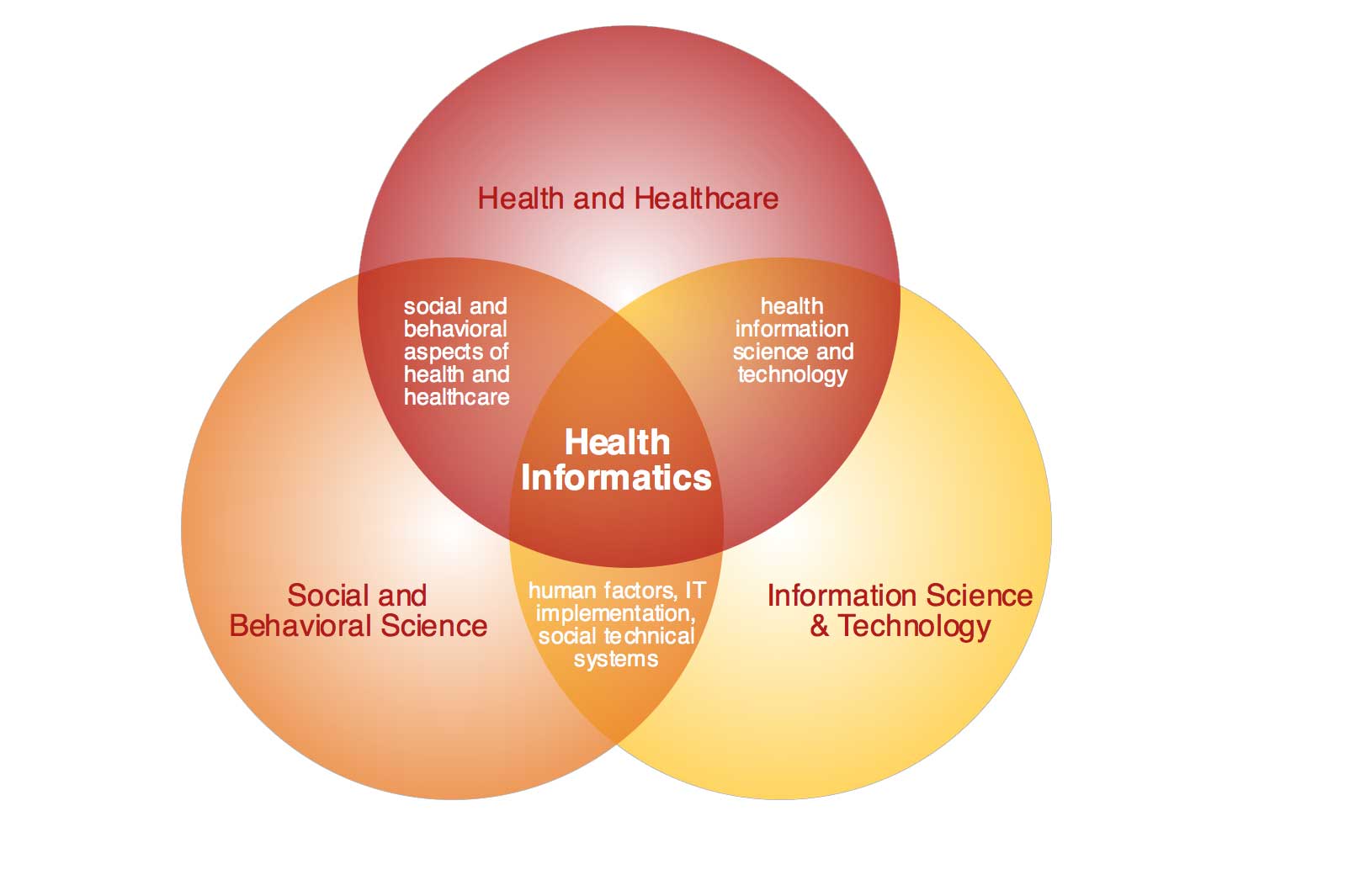Transforming Healthcare Through Data and Information Technology
Our MS in Health Informatics program is focused on the application of information technology, social and behavioral science, and data science in healthcare delivery. We study, develop, and improve health care information technologies. To apply these information technologies effectively, we also study human and organizational behavior.
Core Training
Our core curriculum covers three domains:
- Information technology and data science: Students study research and visualization methods, artificial intelligence, data management, and informatics standards and technology infrastructure.
- Health and health care: Students learn about domestic and global healthcare, with the opportunity to immerse themselves in the daily life of a hospital.
- Human and organizational behavior: Students cover human factors, human-computer interaction, and diffusion of innovation to learn how to position information systems for success.

Innovation
Our program offers innovative key informatics skills blended with healthcare system knowledge. Students study state of the art topics in health informatics such as artificial intelligence, natural language processing, data management, and consumer informatics, culminating in a hands-on capstone project with clients from our industry partners worldwide.
Collaboration is at the core of our program, with students and faculty from a range of fields, working with many collaborating NYC (New York City) institutes and around the world. This diversity creates a unique learning environment. To get a sense of our culture, please take a look at ours Admissions Information.
Our alumni hold positions in data and policy analysis, health information technology, process improvement, consulting, and more at healthcare institutions and startups. Many alumni pursue advanced doctoral studies.
Students can complete the health informatics curriculum in 12 months, we have an option for part-time students as well.
Research Projects
![]() Developing a mobile health application to support heart failure symptom monitoring
Developing a mobile health application to support heart failure symptom monitoring
Prerequisites for Admission
Information Sessions
Alumni Outcomes
Program Director
HI 1 Year Student - Recommended Curriculum Progression
Students are recommended to follow the schedule below in order to ensure eligibility for graduation. The Education Team will monitor progression, but it is ultimately the student’s responsibility to track their progression to ensure they meet graduation requirements. Course offerings and course availability are subject to change. Health Informatics students must take 27 credits of the required courses, and 9 credits of electives (optional courses).
Note that each student must take a statistics placement test prior to the fall term beginning to determine whether the student is waived from taking Intro to Biostatistics with STATA Lab (HBDS 5001). If the student does not pass the statistics placement test, they must enroll in HBDS 5001 in the fall term.
Fall Term
Students take 12 required credits, with the option of 1 or 2 electives
Statistics Placement Test - Optional
0 credits
Introduction to Health Informatics (HINF 5001) - Required
Course Director: Marianne Sharko MD, MS
3 credits
Health informatics is the body of knowledge that concerns the acquisition, storage, management and use of information in, about and for human health, and the design and management of related information systems to advance the understanding and practice of healthcare, public health, consumer health and biomedical research. The discipline of health informatics sits at the intersection of several fields of research – including health and biomedical science, information and computer science, and sociotechnical and cognitive sciences. In recent years we have witnessed how the collection, storage and usage of digital health data has exponentially grown. Increases in the complexity of health information systems have driven growth in demand for a specialized workforce. This course introduces the field of health informatics and provides students with the basic knowledge and skills to pursue a professional career in this field and apply informatics methods and tools in their health professional practice.
Research Methods in Health Informatics and Data Visualization (HINF 5004) - Required
Course Director: Yunyu Xiao, PhD
3 credits
Informatics innovations have their desired impact only when they have high quality, are highly usable, are integrated into their organizational setting, and are widely adopted and used. That makes it critical for informatics students to understand not only how informatics innovations work, but also the users and settings in which they are used. Students will learn methods and models for: measuring data and system quality; assessing and predicting technology adoption (what makes technology sticky?); improving humancomputer interaction via human factors engineering; understanding organizational and systemic challenges in the real world; influencing patients’ health behavior and decisions; and assessing quality, safety, and cost outcomes using health services research study designs. In this mixed methods course, students will gain experience using both quantitative and qualitative methods.
Artificial Intelligence in Medicine I (HINF 5012) - Required
Course Director: Chang Su, PhD
3 credits
Introduces students to a variety of analytic methods for health data using computational tools. The course covers topics in data mining, machine learning, classification, clustering and prediction. Students engage in hands-on exercises using a popular collection of data mining algorithms.
Master’s Project I (HCPR 6010) - Required
Course Director: Faculty
2 credit
This is the culminating capstone course of all masters-level graduate education programs. It has two aims: (1) helping students to discover and develop new and effective ways of managing and working together with all the stakeholders within the healthcare field and (2) helping accelerate a student's development of 12 the context awareness, integrative management, and industry skills that are needed to lead in a rapidly changing healthcare sector. This capstone course puts students in a new organization, one they don’t already know well, and gives them the chance to practice hitting the ground running. This culminating course provides a deeper preparation for the next stages of a student's career. The capstone project will last the entire year: the first term involves matching students with the right project, the second term has students working with their client, and the third term consists of a detailed report and final presentation in front of the client as well as faculty and fellow classmates.
Clinical Medicine for Informaticians (HINF 5024) - Elective
Course Director: Mark Weiner, MD
3 credits
In addition to technical, programming and analytical skills, healthcare informaticians and data scientists need clinical domain expertise to understand and interpret real world data and analytical findings and to communicate effectively with healthcare practitioners and investigators. This course is designed to equip informaticians with a foundational understanding of key concepts in clinical medicine, especially as they relate to the collection, application and interpretation of real world data toward clinical phenotypes and predictive analytics. Students will learn the fundamentals of the cardiovascular, gastrointestinal, respiratory, hematological, endocrine, neurological, musculoskeletal, psychiatric, and renal systems and how diseases in these body systems are reflected in subjective and objective measures collected through patient reports, clinical observations, laboratory tests and ancillary studies. Students will understand the clinicians approach to ordering tests to evaluate for the presence of disease. They will also learn about the variety and classification of pharmacological therapies, the context and rationale for starting and stopping medications, and their intended and unintended effects on body systems. Students will also learn how the physical and social environment in which patients live may impact the recognition and severity of illness, as well as the timing, approach and outcomes of care. Students will be introduced to differentiated care in the management of different patient specialties, including pediatrics and geriatrics.
Healthcare Organization and Delivery (HPEC 5002) - Elective
Course Director: Lisa Kern MD, MPH
3 credits
The goal of this course is to educate students about the complexity and nuances of healthcare delivery. The course will be especially useful for non-clinicians who intend to go into fields that will require a detailed understanding of healthcare. Class sessions will not summarize healthcare; rather, they will analyze healthcare – through themes such as people, time, money, communication, uncertainty, and others. Students will come away from the course with a deeper appreciation of why it is difficult to change healthcare. They will then be able to anticipate the intended and unintended consequences of interventions and policies that they and others might implement.
Introduction to Biostatistics with STATA Lab (HBDS 5001)* - Elective w/ Placement Test
Introduction to Biostatistics with STATA Lab
Course Director: Arindam RoyChoudhury, PhD
4 credits
An introduction to the fundamentals of biostatistics with primary emphasis on understanding of statistical concepts behind data analytic principles. This course will be accompanied with a Stata lab to explore, visualize and perform statistical analysis with data. Lectures and discussions will focus on the following: exploratory data analysis; basic concepts of statistics; construction of hypothesis tests and confidence intervals; the development of statistical methods for analyzing data; and development of mathematical models used to relate a response variable to explanatory or descriptive variables.
Spring Term
Students take 9 required credits, with the option of 1 or 2 electives
Clinical Informatics (HINF 5011) - Required
Course Director: Sameer Malhotra, M.B.B.S., M.A.
3 credits
Prerequisite: Introduction to Health Informatics
Clinical information systems such as electronic health records are central to modern healthcare. This course introduces students to the complex infrastructure of clinical information systems, technologies used to improve healthcare quality and safety (including clinical decision support and electronic ordering), and policies surrounding health information technology.
Health Data Management (HINF 5018) - Required
Course Director: Yiye Zhang, PhD
3 credits
Database systems are central to most organizations’ information systems strategies. At any organizational level, users can expect to have frequent contact with database systems. Therefore, skill in using such systems – understanding their capabilities and limitations, knowing how to access data directly or through technical specialists, knowing how to effectively use the information such systems can provide, and skills in designing new systems and related applications – is a distinct advantage and necessity today. The Relational Database Management System (RDBMS) is one type of database systems that are most often used in healthcare organizations and is the primary focus of this course. An overview of the non-relational database structure will also be given using Python programming language to provide a fuller picture of the current data management landscape. Further, to provide students with opportunities to apply the knowledge they learn from the lectures, various homework assignments, lab assignments, an exam, and a database implementation project will be given.
Master’s Project 2 (HCPR 6022) - Required
Course Director: Faculty
3 credits
This is the culminating capstone course of all masters-level graduate education programs. It has two aims: (1) helping students to discover and develop new and effective ways of managing and working together with all the stakeholders within the healthcare field and (2) helping accelerate a student's development of the context awareness, integrative management, and industry skills that are needed to lead in a rapidly changing healthcare sector. This capstone course puts students in a new organization, one they don’t already know well, and gives them the chance to practice hitting the ground running. This culminating course provides a deeper preparation for the next stages of a student's career. The capstone project will last the entire year: the first term involves matching students with the right project, the second term has students working with their client, and the third term consists of a detailed report and final presentation.
Artificial Intelligence in Medicine II (HINF 5025) - Elective
Course Director: Fei Wang, PhD
3 credits
Prerequisite: Artificial Intelligence in Medicine I
This class will teach students more advanced topics on AI in medicine. It requires students to have taken the AI in medicine I class. The contents of the class cover generalizability of AI models, computational fairness, model interpretation and explanation, privacy and security, federated learning, multi-modal learning, generative AI, causal inference, target trial emulation. The students will be asked to do a final project with teams based on the contents taught in the class, and python programming will be needed for doing the project.
Natural Language Processing (HINF 5016) - Elective
Course Director: Yifan Peng, PhD
3 credits
This course introduces students to the field of natural language processing (NLP), applied to the health domain. NLP focuses on text data, which lacks the structure of conventional tabular data. In the health domain text is abundant in electronic health records, the medical literature and on the Web. Important applications of NLP include information extraction (pulling facts out of text) and information retrieval (searching through a collection of texts). The course presents methods for working with text: identifying the elements (words and symbols), recognizing sentence boundaries, parsing syntactic structures, assigning meaning, and establishing the structure of the discourse as a whole. The students build skills with these methods through laboratory work.
Python for Health Data Sciences (HINF 50**) - Elective
3 credits
Summer Term
Students take 6 required credits, with the option of 1 or 2 electives
Master’s Project 3 (HCPR 6030) - Required
Course Director: Faculty
3 credits
This is the culminating capstone course of all masters-level graduate education programs. It has two aims: (1) helping students to discover and develop new and effective ways of managing and working together with all the stakeholders within the healthcare field and (2) helping accelerate a student's development of the context awareness, integrative management, and industry skills that are needed to lead in a rapidly changing healthcare sector. This capstone course puts students in a new organization, one they don’t already know well, and gives them the chance to practice hitting the ground running. This culminating course provides a deeper preparation for the next stages of a student's career. The capstone project will last the entire year: the first term involves matching students with the right project, the second term has students working with their client, and the third term consists of a detailed report and final presentation in front of the client as well as faculty and fellow classmates.
Health Information Standards & Interoperability (HINF 5020) - Required
Course Director: Jyoti Pathak, PhD
3 credits
In modern healthcare. exchange of clinical data across multiple stakeholders — between healthcare organizations, between providers and patients, and among agencies and governmental entities — is pivotal. Health information standards provide the “backbone” to achieve uniform data interoperability and exchange across multiple heterogeneous systems. This course will introduce existing and emerging clinical data modeling, terminology and knowledge representation standards.
Health Behavior and Consumer Informatics (HINF 5017) - Elective
Course Director: Faculty
3 credits
Consumer health informatics (CHI) is the study of consumer information needs and technologies that provide consumers with the information they need to be more engaged in self-care and healthcare. This introductory CHI course will present an overview of theories of health and information behavior; key concepts and terminology; and main application domains. We will explore how health behavior theories 8 provide a framework for explaining consumers’ health behaviors and how CHI tools that are built with a theoretical foundation can promote health behavior change. The course will cover CHI applications in major application domains including electronic patient portals, mobile health (mHealth), and telehealth. Students will learn how to assess end-user needs and technological practices of potential users who experience health information and technological disparities. Students will also learn how to design for endusers, evaluate CHI applications and research.
Implementation Science and AI Ethics (HINF 5023) - Elective
Course Director: Marianne Sharko MD, MS
3 credits
This course will provide an overview of implementation science and introduce issues surrounding ethics in the use of artificial intelligence (AI) in healthcare. It will explore the challenges in the safe and effective implementation of predictive models, large language models and generative AI in healthcare. It will identify ethical issues surrounding the use of AI in healthcare through the lens of the medical ethical principles of autonomy, beneficence, nonmaleficence and justice and will provide a framework for evaluating the ethics of AI generated tools from the perspective of multiple stakeholders, including patients, providers, health systems and payors. Students will examine predictive models created to assist in healthcare management, understand the challenges in their effective and appropriate implementation, and appreciate the potential for unintended consequences and safety risks. We will explore the need to develop clinical decision support tools that are guided by the principles of fairness, appropriateness, validity, effectiveness, and safety (FAVES). We will discuss the importance of informaticists and providers as advocates for seeking transparency in predictive algorithms, and utilizing measures of reliability, validity, and effectiveness in their outcomes. We will address the importance of advocating for equity in accessibility and the need to address bias in the development of AI-generated clinical decision tools.
We will introduce implementation science, frameworks and theories, including Diffusion of Innovation, RE-AIM and PRISM. We will include projects to provide practical experience in the process of implementation that will highlight research methods, measures, and potential barriers and facilitators.
We will invite experts in the field to provide guest lectures and to lead student workshops within their areas of expertise.
The learning style is mostly student-driven, using “flipped classroom”, participatory exercises, teamwork, workshops and presentations. After the midterm, students will work to define a project, analyze related literature, and give a presentation in the final week.
PHS Internship Course (HCPR 5040) - Elective
1-3 credits
*Contingent upon results of the statistics placement test




